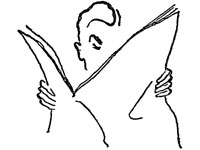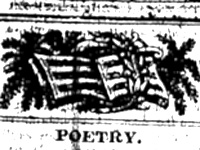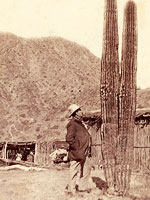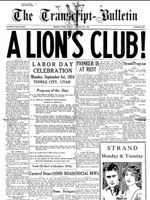Northern Internal Dissent
This iCue Mini-Documentary describes how President Abraham Lincoln was forced to suspend some civil liberties to maintain control during the Civil War.
This feature is no longer available.
This iCue Mini-Documentary describes how President Abraham Lincoln was forced to suspend some civil liberties to maintain control during the Civil War.
This feature is no longer available.
This iCue Mini-Documentary describes Woodrow Wilson's efforts to promote the idea of World War I to a skeptical American public. In order to do so, he turned to one of the leading figures in the advertising industry.
This feature is no longer available.
The Lovejoy State Memorial commemorates abolitionist newspaper editor Elijah P. Lovejoy, who was killed by a mob while defending his printing press at Alton on November 7, 1837. Lovejoy's grave is located nearby.
Website contains no specific information about interpretative services offered at this site.
Video 1:
Video 2:
Video 3:
Video 4:
In 1775, a colonial newspaper reported on Patriots burning tea in Providence, RI. How much can you learn from this newspaper article? Whose point of view is it written from? What does it include and what does it leave out? Barbara Clark Smith reveals the questions she would ask to get the most from this primary source.
This is an article that was in the newspapers, the Patriot press in the 18th century. I tend to find these normally by looking through newspapers, which are generally on microfilm or in special collections. This one, however, I found in a specific collection, which is called the American Archives, edited by Peter Force. And what Peter Force did, in the early 19th century, was go and collect records from newspapers, from state papers, committee papers, and gather them together in several volumes and publish them as part of forming a documentary history of the American Revolution. So, this is a report that appeared in the colonial press. I'm not sure exactly where, but my guess is Boston or Hartford. Possibly more than one press because they tended to copy reports from each other. That's how they got their news, from other newspapers. And it's a report from Providence, RI.
The reason I'm interested in this sort of document is that I'm trying to get a kind of "close to the ground" look at the American Revolution. I want to know what the Patriot movement was like. The movement from, say, 1765 through the Revolution of people protesting parliamentary taxation and legislation. And I want to know less about the leading men who met in conventions and congresses, and who petitioned the King. I know a fair amount about them. I want to know about people on the local ground, ordinary people, women as well as men, and I want to know what was it like for them to become Patriots. And the questions I would bring to looking at these reports and newspapers would include: What is this telling me about ordinary people's participation? Not just what ideas might they bring to joining the revolution, or becoming a Patriot. But also what practices, what things did they have to do to be a Patriot? How do you practice being a Patriot? What does it really mean to join this movement? And what's it like, again, not in the official bodies that we think of as Patriot leaders, but kind of on the local ground, in this case in Providence, RI.
The first thing I was struck by was actually the last sentence, this image of this "Son of Liberty" going around the shops with his lampblack, which is the soot from oil lamps, a kind of black carbon soot. And unpainting the word "tea." It certainly makes me think of more famous events, like the Boston Tea Party. Although that's a real destruction of other people's property, they throw tea that doesn't belong to them into the harbor in Boston. But this seems sort of a smaller offering of one's own tea. But nonetheless, something of a gathering, a really dramatic gathering, where Patriots are expressing their political views.
Elsewhere in the second paragraph it says a great number of inhabitants—you'd really like to know, how many, how many that is compared to all of the inhabitants of Providence. They mention specifically some worthy women. So we know in this case the word "inhabitants" includes women, which sometimes it might or sometimes it doesn't. It doesn't specifically mention anyone else. We get the impression though that this is not limited to people who were qualified to vote. Certainly if women are there, it's not limited to qualified town voters. And possibly therefore there were men and boys present—apprentices, servants, slaves, sailors, any number of people who would normally not be voting and acting politically in that way, even in a town meeting. But who could attend a marketplace to purchase things, or in this case to refuse to purchase or to give up things or to observe.
One thing that I think is intriguing too is there's an argument about tea in this. It's not just a description saying people came to burn their tea. It describes tea for you. That it's needless, we don't need it. It's been detrimental to our liberty and interest and health. And that's intriguing because you can see the logic by which it's detrimental to Patriots' liberty and interest. They don't want to pay taxes on it. They don't think Parliament should be taxing this. Health is another question, and it's interesting that the Patriots raised this issue of how its supposed to be unhealthy just when Britain puts a tax on it, that's not really a common thought in the 18th century—that tea is unhealthy. In fact, people take it in part for medicinal purposes.
There's other information here that you can begin to pick up. That in addition to throwing the tea in the fire, they throw in some newspapers and a printed copy of a speech by Lord North that they disapprove of. And you can go and track down what was Lord North probably speaking about. Rivington's paper, a New York paper, Rivington's a Loyalist, and he's arguing on behalf of parliamentary power. So it's interesting they throw those newspapers in the fire as well. So it's not merely getting rid of the tea. It's all that English stuff.
I think one thing to notice about it is this isn't the kind of newspaper report we would expect, that we would get, of this happening. Even though it's written in the third person by someone describing it as if he or she was there, very authoritative, "this happened." It offers opinions in places where we might expect that you'd interview someone. It doesn't interview Jane Doe and have her say, "Well, I'm really cheerful to be throwing my tea in the fire, because I don't need this noxious weed." It's the reporter telling you and the reporter using language which testifies to his, and I think we can probably use the male pronoun here, position. In reading these it's tricky you will sometimes read pieces like this which talk about true friends of the country and lovers of freedom. And you'll discover the writer is talking about the Loyalists, the Tories, because, of course, they think too that they're the true lovers of America and freedom. So you have to sometimes read for a while to figure that out. In this case it's pretty straight forward, since they're burning Tory newspapers and throwing away tea and supporting the Sons of Liberty.
I'd really like to know more. What happened in organizing this? How did this come about? Who planned it and what was it like to attend and to observe? For example, all right, at noon you hear that you were invited to testify your good disposition to the Patriot cause by bringing your tea. Well, what does it mean if you don't feel like doing it? Does that mean if I don't bring my tea, my neighbors will, from here on out, know that I don't have a good disposition towards the Patriot cause. Does that label me a Tory who is sympathetic to Britain or to parliamentary power?
Similarly, this point that there appeared great cheerfulness in destroying the tea. And that these worthy women made free will offerings of their stocks of the tea. Well, that's a nice description, but you do wonder about those women who maybe didn't want to burn their tea. None of that is covered. If there are women who said, "Not me, I'm keeping my tea," you don't find that out here.
And finally, I think the real clue to the question of coercion or not comes in the last sentence describing a spirited "Son of Liberty" going along the street with his brush and lampblack and unpainting the word "tea" on the shop signs. Well, one wonders what the merchants, whose shops those were, where presumably they sold tea, thought about that. And it strikes me, that we don't have any information here, did he get permission from these merchants ahead of time? Or was this an act that put the merchants in a position where they would have to become quite unpopular with the Patriots if they decided to continue selling tea?
One of the first things I'd do is keep by me a dictionary so I could look up words, particularly a dictionary like the Oxford English Dictionary that has 18th-century meanings. Because often there's a word that will have changed in meaning. One example, they use the term, "the true interest of America." The term "interesting" which people in the 18th century would use to describe a situation, they say "that's an interesting situation." It doesn't mean, "I'm kind of interested in it intellectually," it means it involves people's economic interest, okay. They mean "interest" exactly in that sense almost all the time. And there are other examples, so one thing would be, don't be too far away from a good dictionary and preferably one that can tell you how things were used in the 18th century.
I'd certainly look for any references to people or events and make sure I knew what those were. Look in the history book, see if I could find out who's being referred to, who they assume everyone knows about. I'd go real carefully through the sentences, because 18th-century language, often the sentences are very long, with lots of different clauses which is complicated for us to understand today. And, certainly with newspapers at this time period, where they are either Patriot or Tory newspapers, I'd be looking for the point of view of the writer. In this case, the point of view is someone who's in favor the Patriots. So, that gives us the last thing which is I'd look for what isn't here. And in the case of a Patriot point of view, well, we don't hear about anybody in Providence who disagreed with this. And there, we don't know if there was or was not someone. That's simply absent from this.
One is I would try to contextualize the immediate incident that's being described here, this particular event in Providence, RI. And, the way that I might do that is by looking at other events taking place in Providence, by supporting this document with other descriptions of the event. I would hope I could find in letters or diaries, a description of this tea burning that took place in the marketplace. And I might particularly hope I could find a Tory, or a Loyalist, point of view, somebody who was upset that this happened. And I'd go and look in diaries and letters around the time of March 2nd, and following, look for that.
The second is, after looking at that particular incident, look more broadly at other places where this took place. And it turns out if you just follow in the newspapers, and read diaries and letters from the time, tea burnings are not uncommon in 1775. A variety of them take place in New Hampshire and New Haven, certainly in the New England area, and on into the middle colonies, you can find examples of gatherings like this. So this kind of event is a second context.
The third context, I'd look at the kind of document this is, which is a report in a newspaper. And think a little bit about reading other newspapers, reading to see if this is typical or atypical. I think its reasonably typical. There are a variety of these similar reports of Patriot events in different newspapers of this time period. And to know a little something about how people are reading this. We know that newspaper subscriptions are skyrocketing at this time. And also that people are reading them in taverns. The taverns tend to subscribe. And even people who are illiterate or don't read that well, can have it read to them in taverns. So that's one of the ways this kind of document gets dispersed throughout the colonies.
And then finally I'd want to think carefully about the chronology, about the moment that this represents of March 1775. It's clearly a divisive moment and a moment when people are under some pressure, here in Providence and in other places, to take sides. To get out there and not to say, "I agree with this or that position, I agree with these rights." But vote with your feet, or in this case, vote with your tea. To show up publicly, and to denounce tea drinking and tea drinkers, and take a side and get off the fence. And that makes sense. It's March 1775, it's after the Boston Tea party, which is December of [17]73, so there's a precedent, these people know there's been destruction of tea, which has been very controversial. The first Continental Congress has met and has encouraged people not to drink tea, so we know these people are supporting the Continental Congress, even though that that's never mentioned in here. And it's about, let's see, a month and a little bit, before the outbreak of warfare, so it's a very tense time in New England.

Some newspapers (The Piqua [Ohio] Daily Call, for example) have been digitized but charge quite a fee through the organization that provided that service. Is there any method for educators to access these without the fees?
No blanket method exists for researchers—whether they are educators or not—to access digitized newspaper archives for free. Digitizing or microfilming newspapers takes time and money, and unless an organization or company has received grant funding to do the work, it must find a way to pay for the expenditure. The National Digital Newspaper Program, begun jointly by the NEH, the Library of Congress, and various state-funded organizations has begun the huge task of digitizing U.S. newspapers published between 1836 and 1922, but the project is at a relatively early stage. The Library of Congress’ Chronicling America: Historic American Newspapers website is still merely a sort of prototype, although some newspapers can be searched there. Finding the archives of each newspaper presents a unique case. For example, the entirely free online, searchable archives of The Brooklyn Daily Eagle—from 1841 to 1902—is available via the Brooklyn Public Library website. Some very large or historically significant newspapers, such as The New York Times, The Chicago Tribune, The Liberator, and The Pennsylvania Gazette, have been digitized and access to them is available from commercial sources, such as ProQuest or Gale. College and university libraries often subscribe to various digitized series of newspaper and periodicals, and you could check with a local university library to see what they have. Typically, if you are not a student or a faculty member or staffer of the university or college, you will have to visit the library and search their online databases there. Larger public libraries sometimes also subscribe to such services and make them available online at the libraries themselves, free to those who use the workstations provided. Some large urban public libraries provide free access onsite to digitized archives of their own cities’ major newspapers. Some other commercial services that provide online access to digitized newspapers include NewspaperArchive.com and Ancestry.com. Public and college libraries often have microfilm copies of the archives of newspapers that are or have been published nearby. Regional historical societies or state libraries are other possible repositories for bound newspaper archives or microfilmed versions of them. In some cases, the microfilm might be available via Interlibrary Loan, but in other cases, researchers have to travel to the library to look at the microfilm (or the hard copy) there. In every case, before traveling to a library, researchers should call the library beforehand that (according to their catalog, online or otherwise) appears to have copies of the newspaper and have a librarian verify that the specific issues they wish to look at are indeed included among the issues that the library has. Some newspapers have digitized their archives—their “morgue files”—but only use the database they have created for their own research. Some others make some or all of their digitized archives available for a search fee. Calling the particular newspaper in which you are interested and pitching your case, explaining what you are looking for and how you would use the online access, might have some result, even if only having someone on staff at the paper search for a particular article or articles. Paying a small research fee for this is much cheaper and easier (depending on what you are looking for) than going through archives that consist of bound copies or microfilm. As for The Piqua Daily Call, the paper is still published and a free online searchable archive is available through its website back to 2001. A preliminary search of WorldCat (OCLC) and of the online catalogs of public and private libraries and historical societies in the region provides additional possibilities: The Edison Community College library in Piqua keeps a month’s current issues on hand. The Ohio Historical Society in Columbus has original scattered issues from 1886, 1892, 1896, 1905, 1914-1916, 1922-24, 1926-28, and from 1945-1956. It also has a microfilm copy of issues from 1914-1922. The library at Wright State University in Dayton has a microfilm copy of issues from 1946-1967. The Western Reserve Historical Society in Cleveland has some older scattered copies from 1884 through 1922. And the local history section of the Flesh Public Library in Piqua has a microform version of issues from 1883-1910 (with some gaps), and from 1968-1972.

Freedom's Journal, published weekly in New York City between 1827 and 1829, was the first African American owned and operated newspaper in the U.S. This website presents digitized copies of all 102 issues of Freedom's Journal, available for download in PDF format. In the pages of this newspaper, visitors will find regional, national, and international news, anti-slavery and anti-lynching editorials, and biographies of prominent African Americans, as well as items of interest to New York's African American community, such as obituaries, births, and marriages. The website also provides several links to additional resources on the black press, including a brief biography of Freedom's Journal and a piece by one of the newspaper's subscription agents: David Walker's 1829 Appeal, which called for slaves to revolt against their masters, and is "arguably the most radical of all anti-slavery documents."

This site explores James E. Taylor's legacy as a recorder of western culture. A professional artist, Taylor's newspaper illustrations served to popularize stereotypes of the Western frontier during the post-Civil War years. Like other illustrators and writers of the period, he depicted Indian-White relations in terms of savagery versus civilization and encouraged Americans to visualize the nation's Westward expansion in heroic terms. Taylor made his own illustrations, collected photographs taken by others, and constructed scrapbooks. Following Taylor's lead, the producers of this site use albums to display his work. The site includes about 750 items, taken from the 1,100 items that appeared on Taylor's 118 album pages.
Visitors can search for images by keyword, or can browse by subject or album theme. Each album image is annotated with the date the image was made, the subject, and the creator of the image, and there is an 1,800-word introductory essay for those unfamiliar with Taylor and his work. Visitors should beware that these are high-quality images, and are therefore large files. High-speed connections will make downloading much more manageable. The photographs and images in this collection are a very useful resource for researching westward expansion.

This site includes digitized versions of 28 Utah newspapers as part of the Utah Digital Newspapers project. Currently, the site contains more than 600,000 pages. Researchers using this digital archive may browse each individual newspaper by issue, or elect to search by keyword, article title, weddings, deaths, and births.
The site also features a map that users can scroll over to determine which counties in Utah had newspapers that are currently archived in this database, and the dates covered.
The collections begin in 1879, and feature PDF versions of the newspapers.

This fee-based service provides a range of resources. There are a large number of secondary sources, including more than 2,500 scholarly journals, magazines, newspapers, and trade publications, with full-text access and searching capabilities available for approximately half. "Historical Newspapers" offers an enormous body of primary sources, including access to the following: The New York Times (1851–2001), The Washington Post (1877–1988), The Wall Street Journal (1889–1986), The Christian Science Monitor (1908–1991), and The Los Angeles Times (1881–1984). For recent history, there are articles from more than 500 newspapers worldwide from the 1980s to the present. These include specialized publications from the worlds of business, education, medicine, religion, and sciences and reference resources. ProQuest offers subscribers a variety of product "modules," so materials described above may not be available at all institutions.

Hundreds of thousands of documents spanning four centuries of American history are available in this large archive. Broadsides, ephemera, pamphlets, and booklets are available from 1639 to 1900. More than 1,300 newspaper titles, representing all 50 states, range in date from 1690 to 1922. U.S. Senate and House of Representatives reports, journals, and other documents are available from 1817 to 1980. Legislative and executive documents from the Early Republic are also included. The entire body of documents is keyword searchable, and, in addition, each collection can be searched and browsed individually. These documents shed light on many aspects of American social, political, economic, and cultural history, and can provide a valuable window into the daily lives of early Atlantic peoples. The collection of broadsides and ephemera is especially useful for exploring the history of printing in the United States, as all titles can be browsed by bookseller, printer, or publisher.